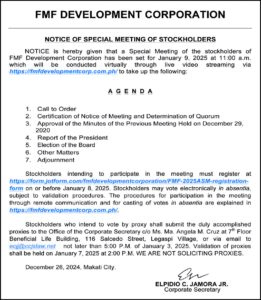By Chloe Mari A. Hufana, Reporter
A FORMER congressman criticized the Armed Forces of the Philippines’ (AFP) plan to procure the United States’ Typhon missile system, warning that such a move risks further entangling the Philippines in dangerous military alliances that threaten national security.
“We denounce the Marcos Jr. administration’s US-satellite-like foreign policy, which has contributed to bringing the world to the brink of a renewed nuclear arms race, instead of amity, goodwill and peace among nations,” Former Bayan Muna Rep. Carlos Isagani T. Zarate said in a statement on Thursday.
“This vassal-like subservience to foreign powers, particularly the US, gravely puts our country’s interests and security at risk.”
He argued that acquiring the missile systems would make the Philippines a “potential target in conflicts not of its own making.”
“The Filipino people should rightfully and strongly condemn both the Marcos Jr. administration and the US for turning the country into a target for nuclear warheads from nations that are not necessarily enemies of the Philippines and its people,” he added in Filipino.
He further criticized the defense spending involved, highlighting its potential impact on the country’s already strained budget.
Josue Raphael J. Cortez, a lecturer at the School of Diplomacy and Governance of De La Salle-College of St. Benilde, said the acquisition of missiles does not necessarily steer the country away from pursuing an independent foreign policy.
“This is because there is a global trend today, particularly for developing countries, to launch initiatives to further bolster their military capabilities,” he told BusinessWorld in a Facebook Messenger chat.
“In light of the circumstances we face today, and the fact that whether we like it or not, our region is where the 21st century Great Game of sorts may unfold, we must also be prepared — and one of the most effective ways to do so is by ensuring that our military capability is fortified enough,” he added.
He noted that an initiative from the AFP can serve as a deterrent to further militarization of the disputed territories.
The Chinese Embassy in Manila criticized Defense Secretary Gilberto C. Teodoro, Jr. earlier this week for his recent statements defending the Philippines’ plan to acquire mid-range missile systems from the United States.
It accused Mr. Teodoro of unjustly attacking China and the Communist Party of China, labeling his remarks as ideologically biased and reflective of a Cold War mentality.
This diplomatic friction follows Mr. Teodoro’s assertion that the Philippines, as a sovereign nation, has the right to procure defense assets without foreign interference.
Philippine Army chief Roy M. Galido on Monday said the Philippines would acquire a mid-range missile system that was deployed by the US Army to its territory in April this year for annual joint military exercises, citing the “the interest of protecting our sovereignty.”
The US Army Pacific in April called the deployment “a significant step in our partnership with the Philippines, our oldest treaty ally in the region,” citing “opportunities for our bilateral training and readiness.”
Mr. Teodoro emphasized that the planned acquisition of the American Typhon missile system aligns with the country’s national interest and independent foreign policy.
China’s Foreign Ministry has labeled the Philippines’ plan to introduce a mid-range missile system as “provocative and dangerous,” suggesting it could incite regional tensions.
The Ministry on Thursday called on the Philippines to return to “peaceful development,” reiterating Manila’s decision to deploy a US medium-range missile system in military exercises would only bring the risks of an arms race in the region.
China will never sit idly by if its security interests were to be threatened, Mao Ning, a spokesperson at the foreign ministry, said at a regular news conference.
The Philippine embassy in Beijing did not immediately respond to a Reuters request for comment. — with Reuters






